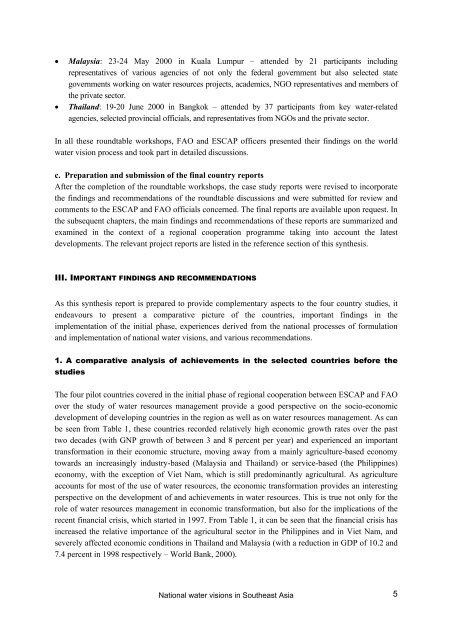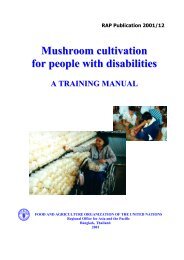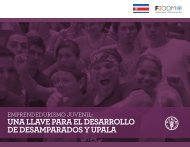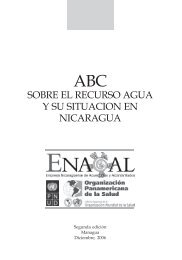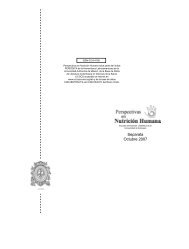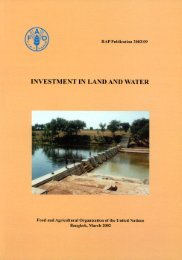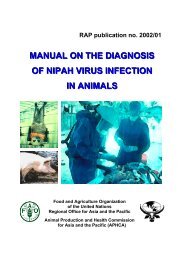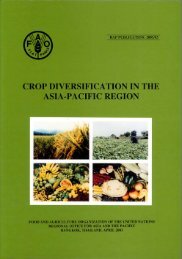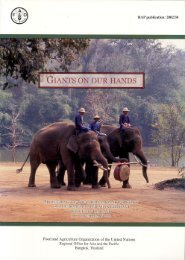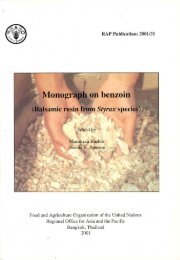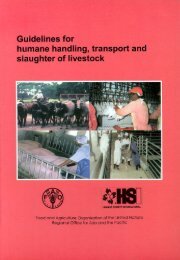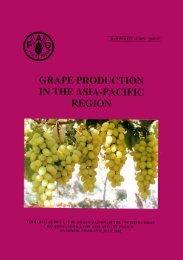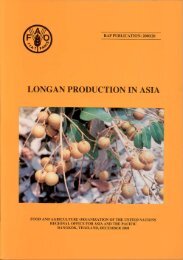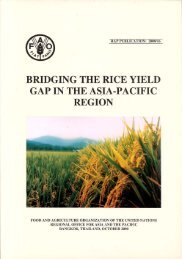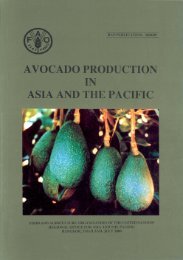The FAO-ESCAP pilot project on national water visions. From vision ...
The FAO-ESCAP pilot project on national water visions. From vision ...
The FAO-ESCAP pilot project on national water visions. From vision ...
Create successful ePaper yourself
Turn your PDF publications into a flip-book with our unique Google optimized e-Paper software.
• Malaysia: 23-24 May 2000 in Kuala Lumpur – attended by 21 participants including<br />
representatives of various agencies of not <strong>on</strong>ly the federal government but also selected state<br />
governments working <strong>on</strong> <strong>water</strong> resources <str<strong>on</strong>g>project</str<strong>on</strong>g>s, academics, NGO representatives and members of<br />
the private sector.<br />
• Thailand: 19-20 June 2000 in Bangkok – attended by 37 participants from key <strong>water</strong>-related<br />
agencies, selected provincial officials, and representatives from NGOs and the private sector.<br />
In all these roundtable workshops, <str<strong>on</strong>g>FAO</str<strong>on</strong>g> and <str<strong>on</strong>g>ESCAP</str<strong>on</strong>g> officers presented their findings <strong>on</strong> the world<br />
<strong>water</strong> visi<strong>on</strong> process and took part in detailed discussi<strong>on</strong>s.<br />
c. Preparati<strong>on</strong> and submissi<strong>on</strong> of the final country reports<br />
After the completi<strong>on</strong> of the roundtable workshops, the case study reports were revised to incorporate<br />
the findings and recommendati<strong>on</strong>s of the roundtable discussi<strong>on</strong>s and were submitted for review and<br />
comments to the <str<strong>on</strong>g>ESCAP</str<strong>on</strong>g> and <str<strong>on</strong>g>FAO</str<strong>on</strong>g> officials c<strong>on</strong>cerned. <str<strong>on</strong>g>The</str<strong>on</strong>g> final reports are available up<strong>on</strong> request. In<br />
the subsequent chapters, the main findings and recommendati<strong>on</strong>s of these reports are summarized and<br />
examined in the c<strong>on</strong>text of a regi<strong>on</strong>al cooperati<strong>on</strong> programme taking into account the latest<br />
developments. <str<strong>on</strong>g>The</str<strong>on</strong>g> relevant <str<strong>on</strong>g>project</str<strong>on</strong>g> reports are listed in the reference secti<strong>on</strong> of this synthesis.<br />
III. IMPORTANT FINDINGS AND RECOMMENDATIONS<br />
As this synthesis report is prepared to provide complementary aspects to the four country studies, it<br />
endeavours to present a comparative picture of the countries, important findings in the<br />
implementati<strong>on</strong> of the initial phase, experiences derived from the nati<strong>on</strong>al processes of formulati<strong>on</strong><br />
and implementati<strong>on</strong> of nati<strong>on</strong>al <strong>water</strong> visi<strong>on</strong>s, and various recommendati<strong>on</strong>s.<br />
1. A comparative analysis of achievements in the selected countries before the<br />
studies<br />
<str<strong>on</strong>g>The</str<strong>on</strong>g> four <str<strong>on</strong>g>pilot</str<strong>on</strong>g> countries covered in the initial phase of regi<strong>on</strong>al cooperati<strong>on</strong> between <str<strong>on</strong>g>ESCAP</str<strong>on</strong>g> and <str<strong>on</strong>g>FAO</str<strong>on</strong>g><br />
over the study of <strong>water</strong> resources management provide a good perspective <strong>on</strong> the socio-ec<strong>on</strong>omic<br />
development of developing countries in the regi<strong>on</strong> as well as <strong>on</strong> <strong>water</strong> resources management. As can<br />
be seen from Table 1, these countries recorded relatively high ec<strong>on</strong>omic growth rates over the past<br />
two decades (with GNP growth of between 3 and 8 percent per year) and experienced an important<br />
transformati<strong>on</strong> in their ec<strong>on</strong>omic structure, moving away from a mainly agriculture-based ec<strong>on</strong>omy<br />
towards an increasingly industry-based (Malaysia and Thailand) or service-based (the Philippines)<br />
ec<strong>on</strong>omy, with the excepti<strong>on</strong> of Viet Nam, which is still predominantly agricultural. As agriculture<br />
accounts for most of the use of <strong>water</strong> resources, the ec<strong>on</strong>omic transformati<strong>on</strong> provides an interesting<br />
perspective <strong>on</strong> the development of and achievements in <strong>water</strong> resources. This is true not <strong>on</strong>ly for the<br />
role of <strong>water</strong> resources management in ec<strong>on</strong>omic transformati<strong>on</strong>, but also for the implicati<strong>on</strong>s of the<br />
recent financial crisis, which started in 1997. <strong>From</strong> Table 1, it can be seen that the financial crisis has<br />
increased the relative importance of the agricultural sector in the Philippines and in Viet Nam, and<br />
severely affected ec<strong>on</strong>omic c<strong>on</strong>diti<strong>on</strong>s in Thailand and Malaysia (with a reducti<strong>on</strong> in GDP of 10.2 and<br />
7.4 percent in 1998 respectively – World Bank, 2000).<br />
Nati<strong>on</strong>al <strong>water</strong> visi<strong>on</strong>s in Southeast Asia 5


